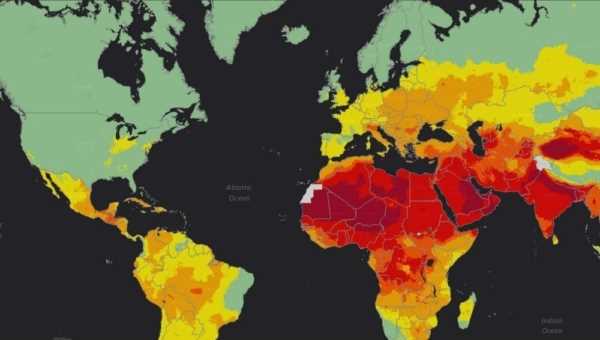
When it comes to air quality, there are several countries that are known for their pristine, pure air. These countries have taken significant measures to protect their environment and ensure that their citizens breathe clean, fresh air. From stunning landscapes to strict regulations, these nations have earned a reputation for having some of the purest air in the world.
One country that stands out for its pure air is Iceland. Located in the North Atlantic Ocean, this Nordic island nation is known for its untouched nature and breathtaking landscapes. With an abundance of geothermal energy, Iceland has been able to generate clean power without relying on fossil fuels, which has greatly contributed to its pristine air quality.
Another country that is renowned for its pure air is New Zealand. With its remote location and strict environmental regulations, New Zealand has managed to maintain exceptionally clean air throughout the country. The country’s vast national parks and protected areas also play a significant role in preserving the air quality, making it a haven for those seeking fresh, unpolluted air.
Canada is also known for its pristine air, particularly in its northern regions. With vast stretches of untouched wilderness and a small population density, the air in Canada remains remarkably pure. The country’s commitment to environmental sustainability and conservation has further contributed to its clean air, making it one of the top destinations for those seeking an escape from polluted urban environments.
While these countries are known for having some of the purest air in the world, it’s important to remember that air quality can vary within regions and cities. Factors such as industrial activities, traffic congestion, and climate patterns can affect the air quality in specific areas. Nevertheless, the countries mentioned above have been successful in prioritizing clean air and offer a breath of fresh air for those seeking a refuge from pollution.
- The Cleanest Country in Terms of Air Pollution
- Finland
- New Zealand
- Factors Affecting Air Quality
- Ranking of Countries by Air Quality
- Top Country with the Purest Air
- Factors Affecting Air Quality
- The Importance of Clean Air
- Reasons for the High Air Quality in [Country Name]
- Measures Taken to Maintain Air Quality in [Country Name]
- 1. Stringent Environmental Regulations
- 2. Promotion of Renewable Energy Sources
- 3. Afforestation and Preservation of Green Spaces
- 4. Public Awareness and Education
- Question-answer:
- Why is air pollution such a big problem?
- Which country has the highest air pollution?
- How is air quality measured?
- Which country has the purest air?
- What are the health effects of breathing polluted air?
- What country has the cleanest air?
- Why is Iceland’s air so clean?
The Cleanest Country in Terms of Air Pollution
Air pollution is a global concern that affects the health and well-being of millions of people around the world. Many countries are taking steps to reduce air pollution, but some nations have made significant progress and can be considered the cleanest in terms of air quality.
Finland
One country that stands out for its remarkably pure air is Finland. Known for its stunning landscapes and pristine nature, Finland boasts some of the cleanest air in the world. The country’s low population density, vast forests, and strict environmental regulations contribute to its exceptional air quality. Finland’s commitment to sustainability and renewable energy also plays a significant role in maintaining clean air for its residents and visitors.
New Zealand
Another country that consistently ranks high in terms of air pollution is New Zealand. With its remote location and limited industrial activities, New Zealand benefits from clean air that is largely unaffected by pollution sources. The country’s focus on sustainable development and preservation of natural resources further helps in maintaining its pristine air quality. Additionally, New Zealand’s emphasis on environmental protection and ecotourism fosters a culture of environmental awareness and contributes to the country’s clean air.
It is worth noting that factors such as geographical location, population density, industrial activities, and environmental policies all play a role in determining a country’s air quality. The cleanest countries in terms of air pollution are those that prioritize environmental protection, engage in sustainable practices, and have policies in place to minimize pollution. By learning from these nations and adopting similar practices, other countries can work towards achieving cleaner air for their populations.
In conclusion, Finland and New Zealand are among the cleanest countries in terms of air pollution. Their commitment to environmental preservation, sustainable development, and strict regulations make them leaders in maintaining pure and healthy air for their citizens.
Factors Affecting Air Quality
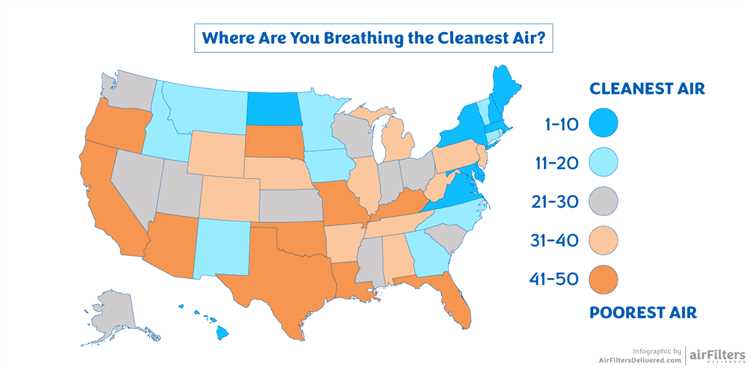
Air quality is influenced by a variety of factors, including both natural and human-made elements. These factors can have a significant impact on the purity of the air we breathe. Here are some of the key factors that affect air quality:
1. Emissions from industries and vehicles: Industrial activities and vehicles release pollutants into the atmosphere, including harmful gases such as carbon monoxide, nitrogen oxides, and sulfur dioxide. These emissions contribute to air pollution, especially in densely populated areas.
2. Burning fossil fuels: The combustion of fossil fuels, such as coal, oil, and natural gas, releases large amounts of pollutants into the air. This includes greenhouse gases like carbon dioxide, which contribute to climate change, as well as particulate matter and volatile organic compounds that can harm human health.
3. Agricultural activities: Certain agricultural practices, such as the use of fertilizers and pesticides, can release harmful chemicals into the air. These chemicals can contribute to air pollution and may also have negative effects on ecosystems and human health.
4. Natural sources: Natural sources of air pollution include wildfires, volcanic eruptions, and dust storms. These events can release large amounts of pollutants into the atmosphere, temporarily affecting air quality in the surrounding areas.
5. Weather conditions: Weather patterns can also affect air quality. For example, stagnant weather conditions can trap pollutants near the ground, leading to higher levels of pollution. On the other hand, strong winds can help disperse pollutants and improve air quality.
6. Geographic location: The geographic location of a region can play a role in determining air quality. Areas near industrial zones or major cities may experience higher levels of air pollution due to the concentration of pollutants from human activities. On the other hand, remote areas with less human activity may have purer air quality.
7. Environmental policies and regulations: Government policies and regulations can also influence air quality. Strict emissions standards and regulations for industries and vehicles, as well as efforts to reduce reliance on fossil fuels and promote renewable energy sources, can help improve air quality over time.
Overall, air quality is a complex issue influenced by a range of factors. Understanding these factors is crucial to implementing effective strategies for maintaining and improving air quality for the health and well-being of both human populations and the environment.
Ranking of Countries by Air Quality
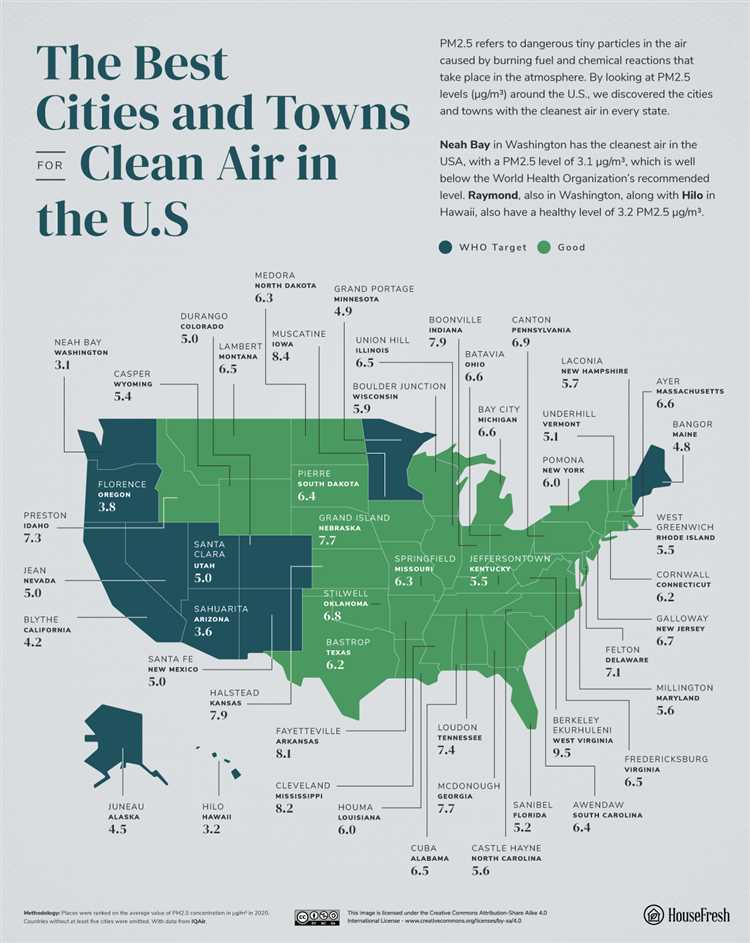
When it comes to air quality, not all countries are created equal. The level of air pollution varies greatly around the world, and some countries have significantly cleaner air than others. Here is a ranking of countries based on their air quality:
- Finland: With its vast forests and low population density, Finland ranks at the top for having the purest air in the world. The country’s commitment to environmental protection and clean energy sources contributes to its exceptional air quality.
- Iceland: Known for its untouched nature and breathtaking landscapes, Iceland takes second place in the air quality ranking. Its isolated location, far from major industrial areas, helps maintain pristine air conditions.
- New Zealand: With its remote location and strict air pollution regulations, New Zealand secures the third spot on the list. The country’s commitment to renewable energy sources and sustainable practices results in clean and fresh air.
- Sweden: Sweden’s dedication to sustainable development and its use of renewable energy sources contribute to its high air quality levels. The country’s cities are known for their clean and unpolluted atmosphere.
- Canada: With its vast stretches of natural landscapes and low population density, Canada ranks fifth in terms of air quality. The country’s strict emission standards and low pollution levels make it a great destination for clean air enthusiasts.
Other countries that deserve honorable mentions for their air quality include Norway, Denmark, Australia, Switzerland, and Estonia. These countries prioritize environmental protection and have policies in place to ensure clean air for their citizens.
It is important to note that air quality can change over time due to various factors, including industrial development, transportation, and natural events. Therefore, regular monitoring and efforts to reduce pollution are crucial to maintaining excellent air quality in any country.
Top Country with the Purest Air
When it comes to clean and fresh air, there are several countries that stand out for having some of the purest air in the world. One such country is New Zealand. Known for its breathtaking landscapes and pristine nature, New Zealand offers incredibly clean air for its residents and visitors.
New Zealand is an island country located in the southwestern Pacific Ocean. Its remote location, minimal industrial activity, and strict environmental regulations contribute to the high air quality found throughout the country. The absence of major cities and heavily polluted areas further enhances the purity of the air in New Zealand.
In addition to New Zealand, Iceland also boasts some of the cleanest air in the world. With its small population and vast expanses of untouched nature, Iceland offers a pollution-free environment. The country’s unique geography, including active volcanoes and geothermal activity, helps to maintain a pristine atmosphere.
Sweden is another country known for its pure air. With its large forested areas and low population density, Sweden enjoys a high level of air quality. The country’s commitment to sustainable development and renewable energy sources further contributes to the cleanliness of its air.
Factors Affecting Air Quality
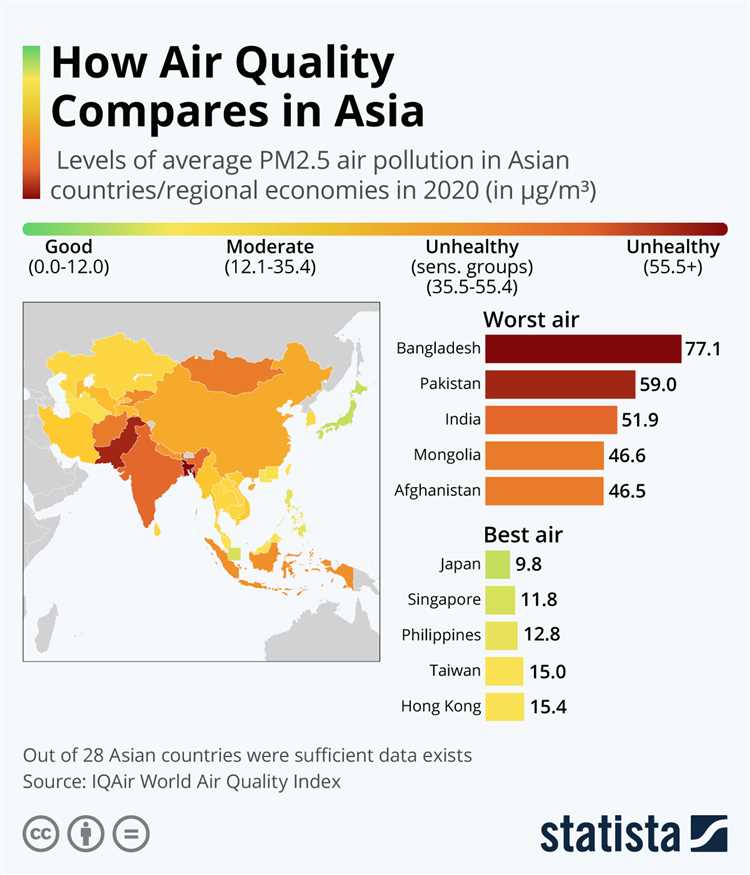
Several factors contribute to a country’s air quality. These include industrial emissions, vehicular pollution, geographical features, and government policies. Countries with low levels of industrialization, minimal urbanization, and strict environmental regulations tend to have cleaner air.
Other factors that influence air quality are the presence of forests and natural reserves, as they act as carbon sinks and filter pollutants from the air. Climate and weather patterns can also affect air quality, as certain conditions may help disperse pollutants or contribute to their accumulation.
The Importance of Clean Air
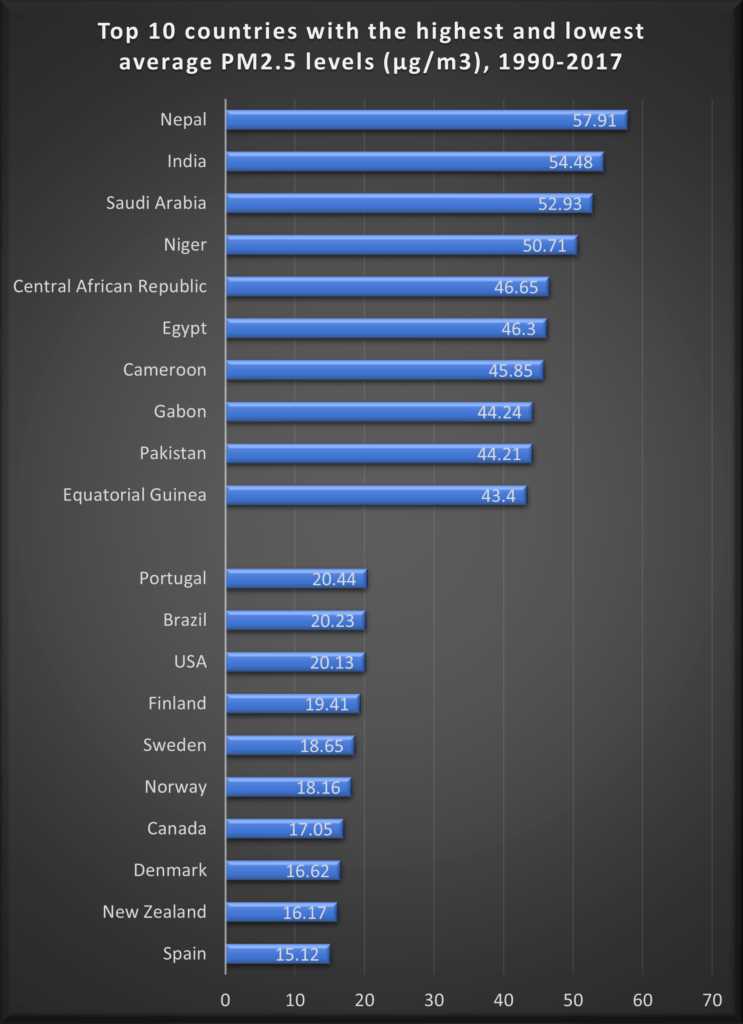
Having clean air is crucial for both human and environmental health. Pollution can have severe impacts on individuals, leading to respiratory problems, cardiovascular diseases, and other health issues. It can also harm ecosystems, affecting plants, animals, and water sources.
Ensuring the purity of the air is essential for creating a healthy and sustainable environment. Countries that prioritize and actively work towards reducing pollution levels contribute to the overall well-being of their citizens and the preservation of their natural surroundings.
Reasons for the High Air Quality in [Country Name]
There are several factors that contribute to the high air quality in [Country Name]. These include:
| 1. Strict Environmental Regulations |
|---|
| One of the main reasons for the high air quality in [Country Name] is the strict environmental regulations that are in place. The government has implemented policies and laws to control and reduce pollution from various sources, such as industrial emissions, transportation, and power plants. These regulations ensure that industries and individuals follow sustainable practices and minimize their impact on the air quality. |
| 2. Investment in Renewable Energy |
| [Country Name] has made significant investments in renewable energy sources, such as solar and wind power. By shifting towards cleaner sources of energy, the country has been able to reduce its dependence on fossil fuels, which are a major contributor to air pollution. The use of renewable energy has helped to reduce emissions and improve the air quality. |
| 3. Efficient Public Transportation |
| [Country Name] has a well-developed and efficient public transportation system. This encourages people to use public transport instead of private vehicles, which helps to reduce the number of vehicles on the road and consequently lowers air pollution. The government also encourages the use of bicycles and walking as alternative modes of transportation, further reducing emissions. |
| 4. Emphasis on Green Spaces and Parks |
| [Country Name] places a strong emphasis on preserving and creating green spaces and parks within its cities. These green spaces act as natural filters, absorbing pollutants and purifying the air. The presence of trees and plants also helps to reduce the heat island effect in urban areas, improving the overall air quality. |
| 5. Public Awareness and Education |
| The government of [Country Name] places great importance on public awareness and education regarding environmental issues. There are campaigns and programs aimed at educating the public about the importance of air quality and the impact of individual actions on the environment. This helps to create a culture of responsibility and encourages people to make choices that positively impact air quality. |
Overall, [Country Name] has taken significant steps to prioritize and maintain high air quality. Through strict regulations, investments in renewable energy, efficient public transportation, green spaces, and public awareness initiatives, the country has been able to achieve and maintain a clean and healthy environment.
Measures Taken to Maintain Air Quality in [Country Name]
[Country Name] is renowned for its commitment to preserving and improving air quality. The government and various environmental organizations have implemented several measures to ensure that the air remains pure and healthy for its citizens. Below are some of the key initiatives taken to maintain air quality in [Country Name].
1. Stringent Environmental Regulations
[Country Name] has implemented rigorous environmental regulations targeting industries and transportation sectors, which are major contributors to air pollution. Strict emission standards are enforced to limit harmful pollutants released into the atmosphere. Regular inspections and fines are imposed on violators to ensure compliance with these regulations.
2. Promotion of Renewable Energy Sources
[Country Name] recognizes the importance of transitioning towards cleaner and more sustainable energy sources. The government has actively promoted the use of renewable energy sources, such as wind, solar, and hydropower, to reduce dependence on fossil fuels. This shift has significantly contributed to a reduction in air pollution caused by the burning of fossil fuels.
Moreover, [Country Name] has incentivized the production and use of electric vehicles (EVs), further reducing emissions from the transportation sector. The adoption of EVs has led to a significant decrease in air pollution levels.
3. Afforestation and Preservation of Green Spaces
[Country Name] places great importance on preserving green spaces and undertaking afforestation projects. Trees play a crucial role in absorbing carbon dioxide and other pollutants, therefore improving air quality. Efforts are made to increase the number of green spaces within urban areas, including parks, gardens, and urban forests, which act as natural air filters.
Additionally, [Country Name] has implemented strict policies to protect its existing natural forests, which not only act as carbon sinks but also help maintain clean air quality.
4. Public Awareness and Education
[Country Name] understands the importance of public awareness and education in maintaining good air quality. Regular campaigns, workshops, and educational programs are conducted to inform citizens about the detrimental effects of air pollution and the steps they can take to reduce their individual carbon footprints.
Through these initiatives, [Country Name] aims to foster a sense of responsibility among its citizens, encouraging them to adopt eco-friendly practices and contribute to keeping the air clean.
In conclusion, [Country Name] has implemented a range of measures to maintain air quality. Through stringent environmental regulations, promotion of renewable energy sources, afforestation, and public awareness campaigns, [Country Name] strives to provide its citizens with the purest air possible.
Question-answer:
Why is air pollution such a big problem?
Air pollution is a big problem because it can have serious health effects on people. Breathing in polluted air can lead to respiratory problems, heart disease, and other illnesses. It can also harm the environment, causing damage to ecosystems and contributing to climate change.
Which country has the highest air pollution?
It is difficult to determine which country has the highest air pollution as it can vary over time. However, some of the countries that are frequently ranked as having high levels of air pollution include India, China, and Bangladesh.
How is air quality measured?
Air quality is measured using a variety of instruments and techniques. One common method is to use air quality stations that measure the levels of various pollutants in the air, such as particulate matter, nitrogen dioxide, and ozone. These measurements are then compared to national or international air quality standards to determine the overall air quality.
Which country has the purest air?
According to a recent study by the World Health Organization (WHO), Iceland has the purest air in the world. This is due to its remote location, limited industrial activity, and strong environmental protection measures. Other countries with high air quality include New Zealand, Sweden, Finland, and Canada.
What are the health effects of breathing polluted air?
Breathing polluted air can have a range of health effects. Short-term exposure to high levels of air pollution can cause irritation of the eyes, nose, and throat, as well as respiratory infections and exacerbation of asthma symptoms. Long-term exposure to air pollution has been linked to an increased risk of heart disease, stroke, lung cancer, and other serious health conditions.
What country has the cleanest air?
According to a study conducted by IQAir, Iceland has the cleanest air in the world. The country’s low population, abundant green spaces, and remote location contribute to its pristine air quality. The absence of heavy industries and traffic pollution also helps maintain the high air quality in Iceland.
Why is Iceland’s air so clean?
Iceland’s air is exceptionally clean due to several factors. Firstly, the country has a low population density, which means less pollution is generated. Additionally, Iceland has a smaller number of industrial activities compared to other countries, reducing pollution from factories and power plants. The country’s abundant green spaces, including vast areas of uninhabited land and untouched nature, also contribute to the overall purity of its air.